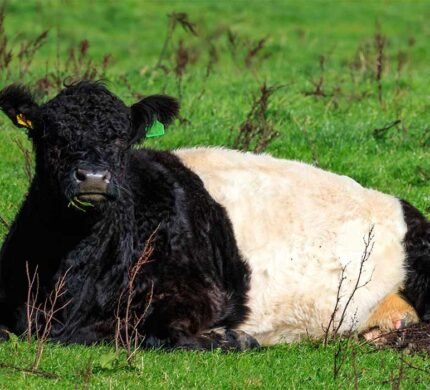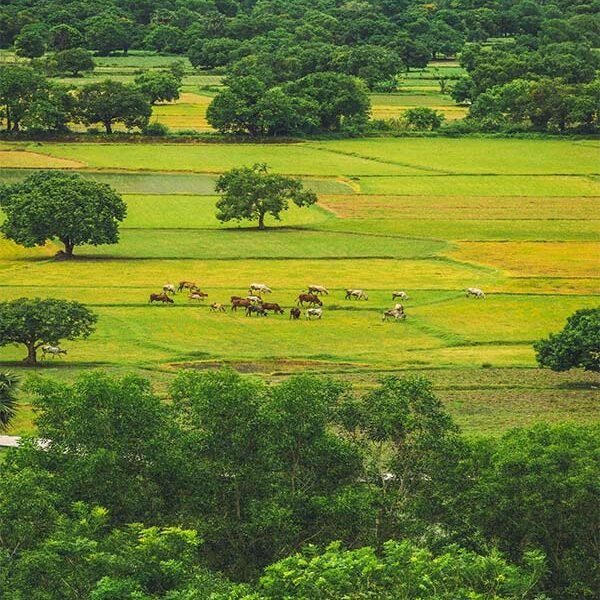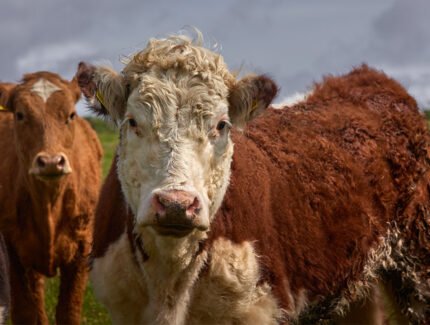Belted Galloway
- Temperature:As low as -34°C (-30°F)
- Milk:Not raised for milk production
- Food:Grasses, legumes, and hay
- Pregnancy:Approximately 9 months
- Nationality:Scottish

General Information
Belted Galloway is a unique breed of cattle that is instantly recognizable by its distinctive, thick, belted coat. They originated in the Galloway region of Scotland and are known for their hardiness, adaptability, and high-quality beef. These medium-sized cattle have a broad, deep body, short legs, and a wide, level back. The average weight of a mature Belted Galloway cow is between 600 and 900 pounds, while bulls typically weigh between 1,000 and 1,500 pounds.
One of the most notable features of Belted Galloway cattle is their thick, woolly coat. The coat is usually black or dark brown, with a distinctive white band that encircles the body. The coat serves as insulation, allowing the cattle to thrive in cold, wet climates. The thick coat also helps to protect the cattle from predators and other environmental factors.
Belted Galloways produce high-quality, well-marbled beef. Foodies like its flavor and tenderness. The breed is also known for its docile temperament. The animals are well-adapted to a wide range of environments.
In addition to beef production, Belted Galloway cattle are also used for conservation grazing. Their hardiness and adaptability make them well-suited to grazing on rough terrain and in areas with limited forage. Their grazing activities can help to control invasive plant species and promote biodiversity in certain environments.
Overall, Belted Galloway cattle are a unique and valuable breed that is prized for their distinctive appearance, high-quality meat, and adaptability to different environments.
Where we find this cow to buy?
You can search for Belted Galloway breeders in your local area or region through online directories or by contacting local agricultural organizations or breed associations.
01. Local area or region: You can search for Belted Galloway breeders in your local area or region through online directories or by contacting local agricultural organizations or breed associations.02. Livestock auctions: Attending livestock auctions or sales is another option to purchase Belted Galloway cows, as these events often feature a variety of cattle breeds.03. Online Marketplaces: Asking about the animal's history, including breeding, genetics, and health records, is also important to ensure you are purchasing a healthy and high-quality animal.04. Breed Associations: It is important to research potential breeders or sellers and to visit the farm or ranch before purchasing any cattle to assess the animals' health and temperament.

How to increase milk production in Belted Galloway?
There are several ways to increase milk production in dairy cows. Here are some of the most common methods:
Milking cows at regular intervals is important for milk production. Cows should be milked at least twice a day, preferably at the same time each day. This helps to maintain milk production and prevent udder infections.
Water is essential for milk production. Providing cows with an adequate supply of clean, fresh water is critical. Water intake is directly related to feed intake and can impact milk production.
Proper udder care and hygiene are essential for milk production. Cows should be kept clean and dry, and their udders should be cleaned before milking. This helps to prevent infections and improve milk quality.
Selecting cows with high milk production genetics can help increase milk production in the herd over time. Breeding programs should focus on selecting cows with desirable milk production traits.
In summary, proper nutrition, adequate water, regular milking, good hygiene, genetic selection, and health management are all important factors in increasing milk production in dairy cows.
Medicine
Belted Galloway cattle do not require any specific medication that is unique to their breed. They generally receive the same medical treatments as other breeds of cattle.
Common medical treatments for Belted Galloway cattle may include vaccinations, parasite control, antibiotics for treating bacterial infections, and anti-inflammatory drugs for pain relief.
Preventive healthcare is important for Belted Galloways and all cattle, and it is recommended to work with a veterinarian to develop a herd health management plan that includes vaccinations, parasite control, and regular check-ups.
It is important to note that any medical treatment for Belted Galloways, or any other animal, should only be administered under the guidance of a licensed veterinarian. Self-medication or the use of unapproved drugs can be dangerous and potentially harmful to the animal.

- The food of Belted Galloway cattle is similar to other breeds of cattle. Herbivores, they eat grasses, forages, and hay. In the pasture, Belted Galloways can obtain most of their nutritional needs from grasses. They need hay or silage in the winter.
- A well-balanced diet is essential for the health and productivity of Belted Galloway cattle. They require a diet that provides the right balance of energy, protein, fiber, and minerals. In addition to forages and hay, some farmers may supplement their Belted Galloways' diet with grains, such as corn or barley, to increase their energy intake.
Important!
It is important to work with a nutritionist or veterinarian to develop a feeding plan that meets the specific needs of your Belted Galloway cattle. They can help you determine the right combination of forages, grains, and supplements to provide a well-balanced diet that meets the nutritional needs of your herd.
Pregnancy
Belted Galloway cows have a gestation period of approximately 280 to 290 days, which is similar to other breeds of cattle. During pregnancy, it is important to ensure that the cow receives proper nutrition and healthcare to support the health of both the cow and the developing calf.
It is crucial to provide adequate nutrition during pregnancy for both the calf and the cow. Diets must provide sufficient energy, protein, and minerals. Nutritionists and veterinarians can help develop a feeding plan for pregnant cows.
In addition to nutrition, healthcare is also important during pregnancy. Pregnant cows should receive regular veterinary care to monitor their health and the development of the calf. This may include regular check-ups, vaccinations, and deworming.
Belted Galloways are known for their ease of calving and maternal instincts, which can make calving relatively straightforward. However, it is important to monitor the cow and calf closely during and after calving to ensure their health and wellbeing.
Overall, proper nutrition and healthcare are critical during pregnancy to support the health of the Belted Galloway cow and the developing calf.
Facts
Here are some interesting facts about Belted Galloway cattle:
Belted Galloways are a hardy and versatile breed of cattle that are well adapted to cold, wet climates. They are originally from the Galloway region of Scotland.
An individual with a black dog with a white belt around his middle has thick, shaggy coats of black hair that have a thick, shaggy coat of black hair. However, they can also be red or dun.
The Belted Galloway breed is known for their docile temperament, making them a popular choice for small farms and homesteads. They are generally easy to handle and work with.
Belted Galloways are a dual-purpose breed, meaning they are used for both meat and milk production. In addition to being highly marbled and flavorful, their meat is very tender.
The shaggy coat of Belted Galloways serves a purpose beyond just appearance. Cold and wet weather are thwarted by their insulation.
Belted Galloways are excellent grazers and are often used for conservation grazing to help manage and restore natural grassland ecosystems.
It has been reported that some Belted Galloway cows can live well into their late teens or early twenties, proving that this breed has a long life span.
Belted Galloway cattle are known for their maternal instincts and are good mothers. Calve easily and produce plenty of milk for their calves.
Belted Galloways are a rare breed, with only around 10,000 registered animals worldwide. Efforts are being made to preserve and promote the breed, and they are becoming increasingly popular for their unique appearance and versatility.